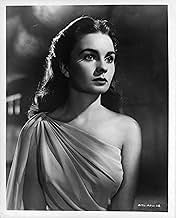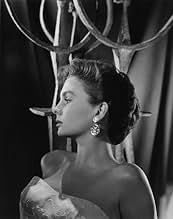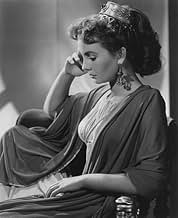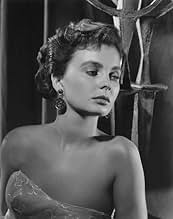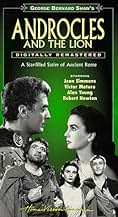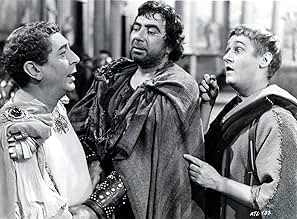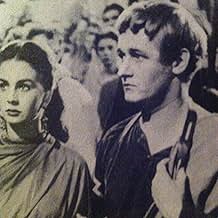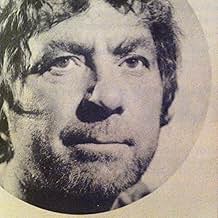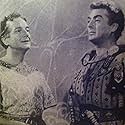NOTE IMDb
6,0/10
1,1 k
MA NOTE
Ajouter une intrigue dans votre langueStory of a Christian in ancient Rome who befriends a lion.Story of a Christian in ancient Rome who befriends a lion.Story of a Christian in ancient Rome who befriends a lion.
- Réalisation
- Scénario
- Casting principal
Abdullah Abbas
- Gladiator
- (non crédité)
Doris Barton
- Vestal Virgin
- (non crédité)
Mary Bayless
- Christian
- (non crédité)
Chet Brandenburg
- Christian
- (non crédité)
Carol Brooks
- Vestal Virgin
- (non crédité)
Avis à la une
In a lengthy letter to the editor in the October 1960 issue of "Films in Review," a very young Robert Osborne supplies some erudition on the casting of "Androcles and the Lion." According to the film historian, shooting began with Harpo Marx in the title role and continued under the direction of Chester Erskine for five weeks. Osborne states that the film's producer and Shaw impresario Gabriel Pascal thought him "the perfect Androcles," and maintains that the rushes were thought to be "brilliant." However, RKO studio boss Howard Hughes had recently seen Alan Young on a TV show, and impetuously insisted that the part be recast. That meant all the footage involving Harpo had to be reshot.
Unfortunately because of the delay two other principle cast members were lost to other commitments: Rex Harrison as Caeser and Dana Andrews as the Roman captain. Footage with them was scrapped and is presumed lost. They were replaced with Maurice Evans and Victor Mature. The two other stars, Robert Newton and Jean Simmons, making her American film debut, were able to stay.
Although IMDb trivia claims that Harpo was only considered for the role, Mr. Osborne's reputation, gravitas, and record of film scholarship gives this anecdote credibility. It certainly is typical of the idiosyncratic and fickle Hughes that he would have these kind of caprices. Just one year earlier after John Farrow had completed "His Kind of Woman," the unpredictable billionaire brought in Richard Fleischer to shoot some additional scenes. Incredibly Fleischer ended up reshooting virtually the entire film when Hughes suddenly decided he now wanted Raymond Burr as the villain and had a large expensive set built in the studio tank for a superfluous sight gag involving Vincent Price that lasted only a few seconds on screen.
Although it's unlikely that any of this footage will surface, if indeed it exists, but one can always hope.
P.S. Victor Mature had a refreshingly off-beat sense of humor, and unlike other egotistical stars of the period, never took himself too seriously. According to co-star Jim Backus, he and Mature decided to go to a local café for lunch rather than suffer through a meal at the RKO cafeteria. The waitress was surprised to see the two men in ancient Roman military uniforms and was shocked and amused to hear the actors ask for the usual "servicemen's discount."
Unfortunately because of the delay two other principle cast members were lost to other commitments: Rex Harrison as Caeser and Dana Andrews as the Roman captain. Footage with them was scrapped and is presumed lost. They were replaced with Maurice Evans and Victor Mature. The two other stars, Robert Newton and Jean Simmons, making her American film debut, were able to stay.
Although IMDb trivia claims that Harpo was only considered for the role, Mr. Osborne's reputation, gravitas, and record of film scholarship gives this anecdote credibility. It certainly is typical of the idiosyncratic and fickle Hughes that he would have these kind of caprices. Just one year earlier after John Farrow had completed "His Kind of Woman," the unpredictable billionaire brought in Richard Fleischer to shoot some additional scenes. Incredibly Fleischer ended up reshooting virtually the entire film when Hughes suddenly decided he now wanted Raymond Burr as the villain and had a large expensive set built in the studio tank for a superfluous sight gag involving Vincent Price that lasted only a few seconds on screen.
Although it's unlikely that any of this footage will surface, if indeed it exists, but one can always hope.
P.S. Victor Mature had a refreshingly off-beat sense of humor, and unlike other egotistical stars of the period, never took himself too seriously. According to co-star Jim Backus, he and Mature decided to go to a local café for lunch rather than suffer through a meal at the RKO cafeteria. The waitress was surprised to see the two men in ancient Roman military uniforms and was shocked and amused to hear the actors ask for the usual "servicemen's discount."
"Androcles and the Lion" is a film adaptation of a 1912 play by George Bernard Shaw. The Irish playwright and author wrote in various mediums with humor and often biting social commentary. He was an avowed socialist and atheist. But, during much of his later life he expounded on a belief in an advanced state of society and being. He thought of it coming about by evolution.
This film and play is a whimsical version of a tale about an early Christian tailor who is taken prisoner and sent to Rome to be tortured and killed in the coliseum. Most people know the tale, so it doesn't come as a surprise. The humorous jabs at religion, history and government enliven the original tale. One might imagine that the play went over well with audiences in the early 20th century, yet Shaw's laborious prologues or narrations afterwards wore out audiences with his vaunting of socialism and lambasting of everything else. Much of Shaw's intent was to parody the early Christian persecution with the treatment by the British government of the common folk of his day. He says so directly in his Afterword to the play. That was Shaw's vehicle to get on his soapbox for socialism.
But, by the mid-20th century, the allure of socialism was fast fading. And, with the memories of war with heathen enemies still fresh, the spoofing of Christianity had lost its appeal. The film flopped at the box office. Many decades later, just some of the script retains its humor, and the film seems slow and quite dated.
The spoofery of early Christianity in the pagan Roman Empire is apparent at the start. As the captives are being marched off to Rome, they sing "Onward Christian Soldiers." The popular English hymn was written and composed in the late 19th century. The early 20th century audiences of Shaw's play would have known that.
The film has a cast of prominent Hollywood and English actors of the time. A couple of other reviewers give some history about the film delays and cast changes after shooting began. So, Rex Harrison, Dana Andrews, George Sanders and Harpo Marx aren't in the film. Victor Mature is a Roman captain in charge of the Christian prisoners. He is attracted to one of the very joyful (and beautiful) Christians, Lavinia, played by Jean Simmons. Can anyone possibly guess how that might turn out?
Elsa Lanchester, Reginald Gardiner, Gene Lockhart, Alan Mowbray, Jim Backus and Strother Martin are some more of the well-known actors of the day. But the person who steals the show and every scene he is in is Robert Newton as Ferrovius. His role and performance are the bulk of the humor in this film. It's solely for his performance that I give this film six stars. His humor of restraint is very funny, while his lines also convey an accurate quality of the early martyrs that people have admired over the centuries. One wonders if Shaw realized that he was as much honoring the early martyrs as he was poking fun at their cause.
Here are some favorite lines from the film.
Spintho, "Christianity is very contagious, captain. You never can tell where it will strike next. We want to be certain that it does not strike our valiant soldiers... and their officers."
Spintho, "The enemy within is just as dangerous as the enemy without, captain."
Spintho, "Her name is Lavinia. I envy the lion." Captain, "Which lion?" Spintho, "The one that will eat her."
Lavinia, "If I don't behave, I shall be thrown to the lions. And if I do behave I shall be thrown to the lions, just the same. Is that what you mean?"
Centurion, "Now, remember that you're a Christian. You gotta return good for evil."
Androcles, "Easy, Ferrovius, easy. You broke the last man's jaw." Ferrovius, "Yes, but I saved his soul. What matters a broken jaw?"
Androcles, "Let him go, brother. Our religion forbids you to strike him." Ferrovious, "On the contrary, it commands me to strike him. How could he turn the other cheek if he's not first struck on one cheek?"
Editor of the Gladiators, "Caesar will go down in history as the emperor who eliminated these cranks. Hail Caesar!" Emperor Antoninus (Caesar), "On the contrary. I'm more likely to be remembered as the man who did more to perpetuate them." Editor of Gladiators, "You, Caesar?" Emperor Antoninus, "I dare say I am doing more to spread Christianity than all their preachers, missionaries and Gospel writers put together. I shouldn't be surprised if finally I wind up as one of their heroes." Editor of Gladiators, "Caesar jests of course." Emperor Antoninus, "Caesar does not jest. I wager that for every Christian that dies in the bloody sand, two new ones leave the coliseum." Editor of Gladiators, "Perhaps then, Caesar should change his tactics." Emperor Antoninus, "Impossible. I am a subject of history and I must submit to its inevitable course. It is my destiny to fan the fires of Christianity by offering them martyrdom in the arena."
Androcles, "The coliseum! I never thought I'd live to see it."
Emperor Antoninus, "Metellus, you see now the disadvantages of two much severity. These people have no hope, therefore there's nothing to restrain them from saying whatever they like to. They're almost as important as the gladiators."
Ferrovius, "I will not fight. I will die. Better to stand with the archangels than with the Praetorian Guard." Emperor Antoninus, "I cannot believe that the archangels, whoever they may be, would not prefer to be recruited form the Praetorian Guard."
This film and play is a whimsical version of a tale about an early Christian tailor who is taken prisoner and sent to Rome to be tortured and killed in the coliseum. Most people know the tale, so it doesn't come as a surprise. The humorous jabs at religion, history and government enliven the original tale. One might imagine that the play went over well with audiences in the early 20th century, yet Shaw's laborious prologues or narrations afterwards wore out audiences with his vaunting of socialism and lambasting of everything else. Much of Shaw's intent was to parody the early Christian persecution with the treatment by the British government of the common folk of his day. He says so directly in his Afterword to the play. That was Shaw's vehicle to get on his soapbox for socialism.
But, by the mid-20th century, the allure of socialism was fast fading. And, with the memories of war with heathen enemies still fresh, the spoofing of Christianity had lost its appeal. The film flopped at the box office. Many decades later, just some of the script retains its humor, and the film seems slow and quite dated.
The spoofery of early Christianity in the pagan Roman Empire is apparent at the start. As the captives are being marched off to Rome, they sing "Onward Christian Soldiers." The popular English hymn was written and composed in the late 19th century. The early 20th century audiences of Shaw's play would have known that.
The film has a cast of prominent Hollywood and English actors of the time. A couple of other reviewers give some history about the film delays and cast changes after shooting began. So, Rex Harrison, Dana Andrews, George Sanders and Harpo Marx aren't in the film. Victor Mature is a Roman captain in charge of the Christian prisoners. He is attracted to one of the very joyful (and beautiful) Christians, Lavinia, played by Jean Simmons. Can anyone possibly guess how that might turn out?
Elsa Lanchester, Reginald Gardiner, Gene Lockhart, Alan Mowbray, Jim Backus and Strother Martin are some more of the well-known actors of the day. But the person who steals the show and every scene he is in is Robert Newton as Ferrovius. His role and performance are the bulk of the humor in this film. It's solely for his performance that I give this film six stars. His humor of restraint is very funny, while his lines also convey an accurate quality of the early martyrs that people have admired over the centuries. One wonders if Shaw realized that he was as much honoring the early martyrs as he was poking fun at their cause.
Here are some favorite lines from the film.
Spintho, "Christianity is very contagious, captain. You never can tell where it will strike next. We want to be certain that it does not strike our valiant soldiers... and their officers."
Spintho, "The enemy within is just as dangerous as the enemy without, captain."
Spintho, "Her name is Lavinia. I envy the lion." Captain, "Which lion?" Spintho, "The one that will eat her."
Lavinia, "If I don't behave, I shall be thrown to the lions. And if I do behave I shall be thrown to the lions, just the same. Is that what you mean?"
Centurion, "Now, remember that you're a Christian. You gotta return good for evil."
Androcles, "Easy, Ferrovius, easy. You broke the last man's jaw." Ferrovius, "Yes, but I saved his soul. What matters a broken jaw?"
Androcles, "Let him go, brother. Our religion forbids you to strike him." Ferrovious, "On the contrary, it commands me to strike him. How could he turn the other cheek if he's not first struck on one cheek?"
Editor of the Gladiators, "Caesar will go down in history as the emperor who eliminated these cranks. Hail Caesar!" Emperor Antoninus (Caesar), "On the contrary. I'm more likely to be remembered as the man who did more to perpetuate them." Editor of Gladiators, "You, Caesar?" Emperor Antoninus, "I dare say I am doing more to spread Christianity than all their preachers, missionaries and Gospel writers put together. I shouldn't be surprised if finally I wind up as one of their heroes." Editor of Gladiators, "Caesar jests of course." Emperor Antoninus, "Caesar does not jest. I wager that for every Christian that dies in the bloody sand, two new ones leave the coliseum." Editor of Gladiators, "Perhaps then, Caesar should change his tactics." Emperor Antoninus, "Impossible. I am a subject of history and I must submit to its inevitable course. It is my destiny to fan the fires of Christianity by offering them martyrdom in the arena."
Androcles, "The coliseum! I never thought I'd live to see it."
Emperor Antoninus, "Metellus, you see now the disadvantages of two much severity. These people have no hope, therefore there's nothing to restrain them from saying whatever they like to. They're almost as important as the gladiators."
Ferrovius, "I will not fight. I will die. Better to stand with the archangels than with the Praetorian Guard." Emperor Antoninus, "I cannot believe that the archangels, whoever they may be, would not prefer to be recruited form the Praetorian Guard."
This 1952 film was the first film version of a George Bernard Shaw play produced after the playwright's death, and the compromises are already obvious.
Shaw had had artistic control over three films produced from his plays-- the 1938 "Pygmalion", "Major Barbara" (1941) and "Caesar and Cleopatra" (1945), and his influence had clearly been felt, some would say for both good and bad. He had had absolute final say-so over the casting, and, after his experience with "Pygmalion", Shaw became somewhat more demanding and insisted that not a word be cut from both "Major Barbara" and "Caesar and Cleopatra", a decision that resulted in both of these excellent films being flops. "Androcles and the Lion" clocks in at less than two hours.
The casting suffers without Shaw's influence. Because this is an RKO release directed by Chester Erskine, a not especially distinguished American director, the cast features two American actors in major roles, and the clash between their style of acting, and that of the British actors who HAVE had experience with Shaw, is apparent. Some other American actors can be seen in bit roles.
In a blatant effort to court the average movie audience who wouldn't recognize a Shaw play if it hit them in the face, movie hunk Victor Mature (yes, the very same actor who appeared in "The Robe" and "Samson and Delilah") is cast in the somewhat demanding role of a Roman captain trying to understand the Christian martyrs. An actor like James Mason or Stewart Granger might have been perfect and would have had the necessary acting ability, but Mature, although apparently trying hard, comes close to wrecking the film and destroying its Shavian flavor. And he gets second billing!
Alan Young, whom most people will remember as Wilbur from the "Mr.Ed" TV series, is also American, but is a far better actor than Mature, and although his style sometimes seems as if it straight out of a sitcom rather than a Shaw play, Young does quite a good job in the all-important lead role of Androcles. But was it the Hollywood adaptors, or is it REALLY Shaw who gave the lion the endearing name of "Tommy"? Or is that just another sop to the movie-going crowd who loves animals with cute names?
The rest of the cast is just fine--Jean Simmons excellent, and not syrupy, as a devout woman willing to face martyrdom in the arena, Robert Newton, hilarious as a hulking strongman converted to Christianity who can barely be kept from singlehandedly demolishing his enemies, Noel Willman, Elsa Lanchester in the brief role of Androcles' wife, and, in his best screen performance, Maurice Evans (Dr. Zaius in the 1968 "Planet of the Apes") as the Roman emperor. They make this film exactly what it should be.
Shaw had had artistic control over three films produced from his plays-- the 1938 "Pygmalion", "Major Barbara" (1941) and "Caesar and Cleopatra" (1945), and his influence had clearly been felt, some would say for both good and bad. He had had absolute final say-so over the casting, and, after his experience with "Pygmalion", Shaw became somewhat more demanding and insisted that not a word be cut from both "Major Barbara" and "Caesar and Cleopatra", a decision that resulted in both of these excellent films being flops. "Androcles and the Lion" clocks in at less than two hours.
The casting suffers without Shaw's influence. Because this is an RKO release directed by Chester Erskine, a not especially distinguished American director, the cast features two American actors in major roles, and the clash between their style of acting, and that of the British actors who HAVE had experience with Shaw, is apparent. Some other American actors can be seen in bit roles.
In a blatant effort to court the average movie audience who wouldn't recognize a Shaw play if it hit them in the face, movie hunk Victor Mature (yes, the very same actor who appeared in "The Robe" and "Samson and Delilah") is cast in the somewhat demanding role of a Roman captain trying to understand the Christian martyrs. An actor like James Mason or Stewart Granger might have been perfect and would have had the necessary acting ability, but Mature, although apparently trying hard, comes close to wrecking the film and destroying its Shavian flavor. And he gets second billing!
Alan Young, whom most people will remember as Wilbur from the "Mr.Ed" TV series, is also American, but is a far better actor than Mature, and although his style sometimes seems as if it straight out of a sitcom rather than a Shaw play, Young does quite a good job in the all-important lead role of Androcles. But was it the Hollywood adaptors, or is it REALLY Shaw who gave the lion the endearing name of "Tommy"? Or is that just another sop to the movie-going crowd who loves animals with cute names?
The rest of the cast is just fine--Jean Simmons excellent, and not syrupy, as a devout woman willing to face martyrdom in the arena, Robert Newton, hilarious as a hulking strongman converted to Christianity who can barely be kept from singlehandedly demolishing his enemies, Noel Willman, Elsa Lanchester in the brief role of Androcles' wife, and, in his best screen performance, Maurice Evans (Dr. Zaius in the 1968 "Planet of the Apes") as the Roman emperor. They make this film exactly what it should be.
An adaptation of a lesser George Bernard Shaw play. It supposedly doesn't "get" the original play, at least according to some other reviews I perused. I'm not even sure what the point of it all was (perhaps that, throughout all times, Christians have been annoyingly self-righteous, but at least during Roman days, you could feed them to lions), and it's a pretty big mess. However, I have to admit, almost grudgingly, that I sort of enjoyed it, perhaps just because of its weirdness. Alan Young plays Androcles, a comedic character with a hen-pecking wife (Elsa Lanchester, really playing it up - I have to wonder why they didn't have her carry a rolling pin). Because of his apparent friendship with a lion (from whose paw, of course, he pulled a thorn), people accuse him of witchcraft, and he is suggested to the Caesar (Maurice Evans) as a potential sacrifice. Also among those sacrifices are Jean Simmons, a beautiful young Christian, and Robert Newton, a pious warrior. Young is amusing in his way, and Evans is quite amusing, but the real reason to watch this film are for Simmons and Newton, both of whom are wonderful. Victor Mature is the least successful member of the cast, playing an army captain who falls for Simmons. He looks as if he's about to have a stroke most of the time. Alan Young is perhaps most famous for playing Wilbur on Mr. Ed, but to my generation he's even better known as the voice of Scrooge McDuck in stuff like Mickey's Christmas Carol and, of course, DuckTales. He's in his 90s nowadays and is still doing Scrooge McDuck.
George Bernard Shaw was hesitant about allowing his plays to be turned into movies. He was impressed with motion pictures, and frequently allowed himself to be in short subjects where he could reveal his current social theories. Shaw was probably the first major literary figure to leave several reels of film interviews. But he was aware of the liberties taken with literary properties turned into movies - particularly plays. Shakespeare had not fared too well in the movies up to the 1930s. Most filmed plays seemed cut up - the screenwriters, producers, and directors being concerned with time factors. Shaw did not trust his works in their hands.
Shaw found an above-average producer in Gabriel Pascal. Pascal loved Shaw's works and he went to see him. He admitted that he had little money but showed his devotion to Shaw's ideas. Shaw gave him a contract to produce all his plays. From 1938 to 1950 Pascal only produced three films but they were PYGMALION with Leslie Howard and Wendy Hiller, MAJOR BARBARA with Hiller, Robert Morley, Rex Harrison, and Robert Newton, and CAESAR AND CLEOPATRA with Vivian Leigh, Claude Rains, Steward Granger, and Flora Robson. They all remain memorable movies to this day. Although Shaw did complain of some deletions he was well served by these films.
In 1950 Shaw died, but his contract with Pascal was to last until Pascal died. However, Pascal only produced one last film, ANDROCLES AND THE LION. Produced by RKO it was the shortest of the Pascal movies, most likely due to the production standards and controls of RKO boss Howard Hughes. The casting was quite unique, in that the roles were played by pretty well known actors: Newton again, Alan Mowbray, Reginald Gardiner, Victor Mature, Jean Simmons, and Maurice Evans. Although Mature is stiff he gives a capable performance. Newton (not drunk here, like he was in BLACKBEARD) showed what a fine comic actor he could be. Witness the scene where he almost frightens Gardiner to death while explaining why he has become a changed man since he converted to Christianity. Maurice Evans, best recalled now as "Maurice" the father of Samantha on BEWITCHED, gave one of his three best lead parts (with his villain in KIND LADY and his Sir Arthur Sullivan in THE GREAT GILBERT AND SULLIVAN)as the philosophic Roman Emperor. Simmons lightens the film's love story with Mature. She always gave good performances. The interesting role in the film is the lead: Alan Young.
Young's career was taking off in 1952. He had started appearing on television in his own weekly variety/comedy program. He also was looking forward to other film roles. There would be another lead part in the now forgotten AARON SLICK FROM PUNKIN CREEK shortly afterward, and eventually nice supporting roles in TOM THUMB and (possibly his best performance) THE TIME MACHINE (1960). And then his role as Wilbur Post in MR. ED. Not a tremendous career but it got quite a bit of mileage in it, and it is still recalled fondly. He gives a nice performance as a soft-spoken, meek Androcles, who represents the truest spirit of Christianity of all the characters in the film (most of whom do not fully grasp the simplicity and quiet goodness at the heart of the faith). It does not hold center stage or attention in the movie (in fact it is forgotten while we concentrate on the antics of Newton's "muscular" Christianity or the Simmons/Mature romance or Evans' cat and mouse game with a courtier who happens to be a secret Christian, but also a political opportunist). But when Young turns up again, he does keep our attention in his scenes.
The result is an enjoyable film, but not of the standard of the three preceding ones. It would be the model (now that Shaw was dead, and soon after Pascal) of how the movies would treat Shaw's plays. The great dramatist was lucky that Pascal gave his all on those first three, for (except for the film of the musical version of PYGMALION - MY FAIR LADY) most of the remaining films of Shaw's plays (THE DOCTOR'S DELEMMA, THE DEVIL'S DISCIPLE, THE MILLIONAIRESS, GREAT CATHERINE) showed more of the cutting and rewriting - and usually inferior rewriting - that Shaw dreaded. Of the post-1952 films only THE DEVIL'S DISCIPLE and MY FAIR LADY hold up really well.
But there is one intriguing mystery about this film project. Pascal and Howard Hughes did come up with an odd casting of the lead role that was not seen to it's conclusion to the everlasting loss of motion pictures. Androcles was not originally cast for Alan Young, but for Harpo Marx. There were discussions with Harpo to play the role, and there may have been some actual footage shot for about a month, when Hughes decided it was not going to work out. Harpo was removed from the film, and Young got the role. Leaving a great hole in the story: what was the original film to be - was Harpo to perform his usual way (pantomime) or did he actually essay for the first time in his career to speak the lines. We don't know. While footage of lost movies occasionally turns up (such as Joseph Von Stenberg's I CLAUDIUS), most of these films that are jettisoned are destroyed. One hopes that Harpo's attempted performance was put on some film that has survived. It would be wonderful to see him in a talking role in a serious play by an English literary master. Harpo prided himself on his erudition and self-taught education He was a member of the Algonquin Circle with Kaufman and Hart, Alexander Woolcott, Edna Ferber, and Morris Ryskind. He should have made a fascinating figure as Androcles, but instead he was replaced. I safely feel it was our loss.
Shaw found an above-average producer in Gabriel Pascal. Pascal loved Shaw's works and he went to see him. He admitted that he had little money but showed his devotion to Shaw's ideas. Shaw gave him a contract to produce all his plays. From 1938 to 1950 Pascal only produced three films but they were PYGMALION with Leslie Howard and Wendy Hiller, MAJOR BARBARA with Hiller, Robert Morley, Rex Harrison, and Robert Newton, and CAESAR AND CLEOPATRA with Vivian Leigh, Claude Rains, Steward Granger, and Flora Robson. They all remain memorable movies to this day. Although Shaw did complain of some deletions he was well served by these films.
In 1950 Shaw died, but his contract with Pascal was to last until Pascal died. However, Pascal only produced one last film, ANDROCLES AND THE LION. Produced by RKO it was the shortest of the Pascal movies, most likely due to the production standards and controls of RKO boss Howard Hughes. The casting was quite unique, in that the roles were played by pretty well known actors: Newton again, Alan Mowbray, Reginald Gardiner, Victor Mature, Jean Simmons, and Maurice Evans. Although Mature is stiff he gives a capable performance. Newton (not drunk here, like he was in BLACKBEARD) showed what a fine comic actor he could be. Witness the scene where he almost frightens Gardiner to death while explaining why he has become a changed man since he converted to Christianity. Maurice Evans, best recalled now as "Maurice" the father of Samantha on BEWITCHED, gave one of his three best lead parts (with his villain in KIND LADY and his Sir Arthur Sullivan in THE GREAT GILBERT AND SULLIVAN)as the philosophic Roman Emperor. Simmons lightens the film's love story with Mature. She always gave good performances. The interesting role in the film is the lead: Alan Young.
Young's career was taking off in 1952. He had started appearing on television in his own weekly variety/comedy program. He also was looking forward to other film roles. There would be another lead part in the now forgotten AARON SLICK FROM PUNKIN CREEK shortly afterward, and eventually nice supporting roles in TOM THUMB and (possibly his best performance) THE TIME MACHINE (1960). And then his role as Wilbur Post in MR. ED. Not a tremendous career but it got quite a bit of mileage in it, and it is still recalled fondly. He gives a nice performance as a soft-spoken, meek Androcles, who represents the truest spirit of Christianity of all the characters in the film (most of whom do not fully grasp the simplicity and quiet goodness at the heart of the faith). It does not hold center stage or attention in the movie (in fact it is forgotten while we concentrate on the antics of Newton's "muscular" Christianity or the Simmons/Mature romance or Evans' cat and mouse game with a courtier who happens to be a secret Christian, but also a political opportunist). But when Young turns up again, he does keep our attention in his scenes.
The result is an enjoyable film, but not of the standard of the three preceding ones. It would be the model (now that Shaw was dead, and soon after Pascal) of how the movies would treat Shaw's plays. The great dramatist was lucky that Pascal gave his all on those first three, for (except for the film of the musical version of PYGMALION - MY FAIR LADY) most of the remaining films of Shaw's plays (THE DOCTOR'S DELEMMA, THE DEVIL'S DISCIPLE, THE MILLIONAIRESS, GREAT CATHERINE) showed more of the cutting and rewriting - and usually inferior rewriting - that Shaw dreaded. Of the post-1952 films only THE DEVIL'S DISCIPLE and MY FAIR LADY hold up really well.
But there is one intriguing mystery about this film project. Pascal and Howard Hughes did come up with an odd casting of the lead role that was not seen to it's conclusion to the everlasting loss of motion pictures. Androcles was not originally cast for Alan Young, but for Harpo Marx. There were discussions with Harpo to play the role, and there may have been some actual footage shot for about a month, when Hughes decided it was not going to work out. Harpo was removed from the film, and Young got the role. Leaving a great hole in the story: what was the original film to be - was Harpo to perform his usual way (pantomime) or did he actually essay for the first time in his career to speak the lines. We don't know. While footage of lost movies occasionally turns up (such as Joseph Von Stenberg's I CLAUDIUS), most of these films that are jettisoned are destroyed. One hopes that Harpo's attempted performance was put on some film that has survived. It would be wonderful to see him in a talking role in a serious play by an English literary master. Harpo prided himself on his erudition and self-taught education He was a member of the Algonquin Circle with Kaufman and Hart, Alexander Woolcott, Edna Ferber, and Morris Ryskind. He should have made a fascinating figure as Androcles, but instead he was replaced. I safely feel it was our loss.
Le saviez-vous
- AnecdotesAfter principal filming was completed, Howard Hughes decided the film needed some extra sprucing up. He had Nicholas Ray shoot a "Vestal Virgin Bathing Sequence" which immediately ran afoul with censors and enraged producer Gabriel Pascal, amongst others. The sequence was eventually deleted from release prints.
- GaffesThe Christians sing "Onward, Christian Soldiers" - a hymn published in 1871.
- Crédits fousOpening credits prologue: ROME 161 A.D. IN THE REGION OF THE EMPEROR ANTONINUS
- ConnexionsFeatured in It's Showtime (1976)
- Bandes originalesOnward, Christian Soldiers
(uncredited)
Music by Arthur Sullivan
Words by Sabine Baring-Gould
Sung by the marching Christians
Meilleurs choix
Connectez-vous pour évaluer et suivre la liste de favoris afin de recevoir des recommandations personnalisées
- How long is Androcles and the Lion?Alimenté par Alexa
Détails
Box-office
- Budget
- 1 250 000 $US (estimé)
- Durée1 heure 38 minutes
- Couleur
- Rapport de forme
- 1.37 : 1
Contribuer à cette page
Suggérer une modification ou ajouter du contenu manquant

